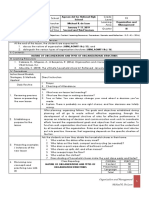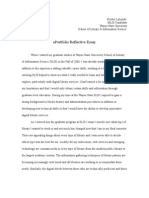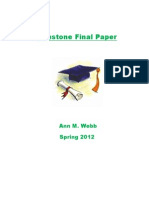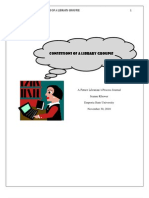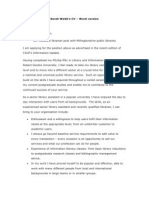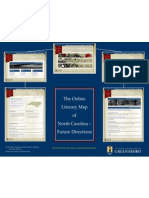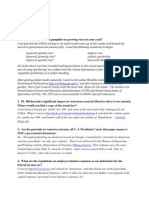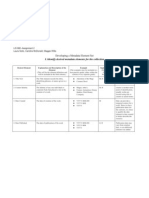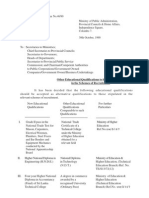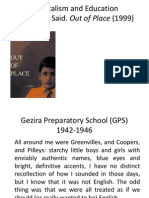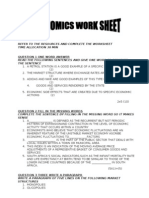LIS Reflections: Maggie Willis
LIS Reflections: Maggie Willis
Uploaded by
api-133844763Copyright:
Available Formats
LIS Reflections: Maggie Willis
LIS Reflections: Maggie Willis
Uploaded by
api-133844763Original Title
Copyright
Available Formats
Share this document
Did you find this document useful?
Is this content inappropriate?
Copyright:
Available Formats
LIS Reflections: Maggie Willis
LIS Reflections: Maggie Willis
Uploaded by
api-133844763Copyright:
Available Formats
4/1/2012
LIS Reflections
Maggie Willis
Introduction
Librarians, as an integral element of the information superstructure, provide not only quick answers, like many of the other information-gathering options so prevalent in our wired world, but also an irreplaceable service to society. When I first entered the Library and Information Studies program two years ago, I had only a vague inkling of the true value added to society by libraries and librarians. As my educational career is coming to an end, I realize that I still hold the same values as regards librarianship as I did starting out, the difference being that I now have a clear grasp of the foundations of librarianship to further confirm my original sentiments towards the library profession. I decided to try out library school after having worked in an unusual field of the information preservation/distribution industry. As a Lab Technician in a professional photo lab for the five years or more before starting grad school, I came to realize a love for organizational systems as well as a love of service to those seeking technical help outside of their realm of expertise. I was also enlightened as to the importance of preservation and the essential nature of every information artifact, no matter how small or personal. The next logical step to me was a career involving the provision of information in a less commercial and less specified field. The library was the obvious choice. Throughout my studies and experiences as a library student I have progressed from wide-eyed wonder, completely oblivious as to how libraries actually work and what they really provide, to a wide-eyed wonder with a good
feel for the inner workings and daily miracles of one of the most important community service organizations operating in our society.
Professional Values
Like all members of a profession, librarians have a set of common ideals by which goals are set and plans are made. Without a clear idea of shared values librarians, and in consequence libraries, would be floating in a sea of confusion, with no guiding stars to use for navigating the sometimes harrowing gulf between the difficult worlds of information provision and community service. As a first term student I was tasked with the daunting undertaking of defining my values as relates to the library profession. At first this was rather difficult for me, not being one to externalize my thoughts and feelings. However, once I got started, and gained a more-than-passing acquaintance with the professional and academic literature on the subject, I became much more confident in the expression of my ideals. My Professional Values Statement, which I wrote as part of the LIS 600 Foundations class, is the ultimate expression of my innermost beliefs about librarianship. The three core values I chose as most clearly representative of my own personal views on the field of librarianship are: freedom of access, a commitment to learning, and a striving for excellence in professional service to the community. These three tenets, distilled from the ALA code of ethics, represent the backbone of any information service industry and especially that of the most service-oriented sector, the library. As I stated in my original Professional Values Statement: The freedom to disseminate and access information equally among all people and including all information as well as a variety of media is an essential element in maintaining an open society. Throughout the LIS program I have been
reminded again and again the important role libraries play in providing free and equal access to information. As part of the LIS 614 Public Information course we have studied the way the Federal Depository Program has been a key means to provide the public with access to information about our government that would be otherwise unobtainable. I have learned the just how essential depository libraries can be for the maintenance of a truly democratic society. As part of an independent study I started on the development of a website for a local homeless center in Greensboro, NC. Through this process, although not in a library, I found a true definition of access. Many of those who exist in the lower strata of our advanced society are easily overlooked by all but the most community minded of organizations. Although they technically have the same freedoms of use of the standard information systems that everyone else has, this means nothing without free access to equipment and expertise. Libraries are one of the few organizations willing and capable to fill this void in information provision inherent in a polarized society such as ours is today. Another aspect of librarianship that serves for me not only the role of value, but also as attractor to the profession, is that of commitment to learning. I love to learn, be it through books, experience, or any other medium. My first attraction to libraries was through my desire to use their free services as a means to a better education and this continues to be the guiding force behind my love of the profession. Libraries are often referred to as the peoples university and I believe this is one of their chief functions in a society where not everyone can go to college and where not everything worth learning can be taught there. The task that best represents this value to me is the Annotated Bibliography that I completed as part of the LIS 620 Reference class. Through
the completion of this paper I got a little taste of what it means to truly help others to find information. Reference is not only about finding one specific answer to a question but about guidance and teaching someone how to use resources to provide them with information independence. Yes, sometimes people come to libraries to find one answer to one question, but this is rare. Using the library is more about the experience of being educated by library staff and library resources to be a more proficient information user. The last value, a striving for excellence in professional service to the community, is one which needs very little explanation. I have come to realize this in a myriad of ways throughout the LIS program but chiefly through my experiences in the LIS 650 Library Management class. The Library Administrator Interview was an especially eye-opening step for me on my path towards awareness of the full meaning of the term service. I now realize that not only should service be part of a librarys stated list of goals, but it should be the end-all be-all of a librarys existence. A library staff, from management all the way down, must have a deep and unwavering commitment to serving the community. This is one of the few aspects of librarianship that technology and private enterprise will never be able to replace and is possibly, even beyond information access, the point of the whole show.
Research
One oft-overlooked element of the librarians job is research. Before starting the LIS program I was unfamiliar with just how important librarians are to this information gathering process. I have now, through multiple research assignments, gained an insight into exactly what is required of a librarian, not only in conducting research within our own field, but also in assisting others to fulfill their information needs.
The first major assignment I completed for the program, the Action Research Project for LIS 600 Foundations, really changed my perception of the way research is conducted, as well as the way findings are analyzed. I chose to study the New Hanover County Public Library systems use of graphic novels for this project, and I learned not only a great deal about the art of conducting research but also that research can result not only in statistics and hard facts, but findings can serve to illustrate the general outlook of an entire system. As part of this project I conducted interviews with a few librarians at each branch in the system and with the librarian in charge of the graphic novels collection, as well as monitoring and comparing the circulation stats of randomly chosen graphic novels and their text-based subject counterparts. Through the planning and implementation of my projects individual elements (surveys, interviews, lit reviews, analysis, and writing) I came to see the value of research to affect immediate change in a library environment. I found that although the information in the comics format was much more popular than the same information in text-only format, the librarians who are the gateways to this information were uninformed as to the value of their comics collection and were unable to use the collection in a meaningful way beyond recommendations for pleasure reading to young adults. I found that staff was unintentionally misusing a core element of the librarys collection due solely to lack of education about a particular medium. The findings of an action research project can become the catalyst necessary for change in a stagnant workplace, where staff is unaware of the need for improvement. Following the same path as the Action Research Project is the Needs Assessment Project for LIS 650. My group and I are working with a group of administrators at High Point Public Library to develop and implement a surveybased research project into the prospective use of e-readers at the library. The library currently offers eBook assistance and device education as well as a plethora of books available for downloading, but they are interested in finding out if it would behoove them financially to purchase e -readers for patron
check-out use. We are surveying patrons using social media and traditional face-to-face methods, and surveying library staff on their opinions of and experience with e-reader/tablet usage. It is a great learning experience to get to work with a highly professional team such as that at High Point Public to find out how they go about making purchasing and policy decisions. A library doesnt just make decisions based on trends but really needs to study its user population and determine how they can best be served. Libraries have an almost continual need to not only provide information but also to collect it. Without using research methods like those learned in the LIS program libraries would have very few options to turn to in their search for excellence in community service. On a more traditional, university-oriented research note, I completed two major research projects involving the standard methods of using library resources to develop bibliographic guides for particular subjects. The first, the Annotated Bibliography for LIS 620 Reference, involved vetting of possible sources along with a detailed analysis of chosen materials. One of the most common justifications for the use of libraries over the use of the internet is the importance of quality over quantity. This concept was perfectly illustrated by the development of a working, academic bibliography of my chosen subject, using only means appropriate for one doing university level research and above. At times a quick internet search will suffice for a casual inquiry, but in many instances a lot more is needed than is currently provided by general search engines and quick answer sites. This is the point at which the librarian steps in to guide the researcher toward a better understanding of the available options and often librarians due this through the development of an online learning guide. In the LIS 615 Collections Management class I completed a similar project to the Annotated Bibliography but this Wiki was designed to be made available for use in an online environment.
With my chosen topic of again, comics in libraries, I was able to compile a detailed list of resources useful for librarians interested in learning more about the comics medium as part of a valid element in library collections. Although annotated bibliographies are very useful, the wiki can serve as a modern update to this more traditional method of resource collection. With most resources now being accessible via the internet it makes sense to create a resource guide usable through those methods. I now feel capable not only of collecting and vetting resources, but also of providing those lists in a variety of ways useful to multiple user sets. As for a different, more publication-oriented, approach I have as example a research paper on Folksonomies I did for the LIS 688 Metadata class and the Current Issues paper I did for LIS 600. Both of these papers are standard research reports which take advantage of the current academic literature published in each area. Although it would seem that this format may have less to teach a library student, outside of the topic being researched, I would disagree. It is essential for a professional librarian in an academic setting to be capable of synthesizing the current literature on a topic within their field into a coherent summary with which to educate others. As someone who is considering a career path in academic libraries it is also important for me to be able to learn to write about such issues in a publishable manner. My main focus in the program has been cataloging and as such metadata as a topic has played a large role in my studies. The paper I worked on about folksonomies taught me a great deal as regards the future of cataloging. Systems are changing due the new digital nature of information provision, and librarians of the next generation will have the responsibility of guiding the process through yet another stage of growth. Just as libraries had to adjust to using OPACs and MARC records, we will have to adjust our way of thinking about organizing information to incorporate new ways of searching popularized by internet searching in the private sector. The programs we develop now will have repercussions on libraries for many years into the future
and we need to be prepared to take advantage of the current literature in order to make the most informed decisions possible.
Professional Development
During my time in the LIS program some of the most meaningful learning opportunities have come in the form of practical experience. I did a practicum during my second semester in the program in the Cataloging Department of Jackson Library on the UNC-G campus and after finishing with my required hours stayed on their as a paid Student Assistant and as a cataloging volunteer. As a result of my working with Mary Jane Conger, Head Cataloger at Jackson, I was recommended for a position as Project Coordinator on a cataloging project at the Bernice Bienenstock Furniture Library in High Point, North Carolina, where I work with Mary Jane to catalog the librarys entire collection of around five thousand books. If I was forced to pinpoint one element as the pinnacle of my LIS program experience I would choose my time as a practicum student in Jackson Library. I became interested in cataloging during the LIS 650 Cataloging class and when Mary Jane mentioned during one of her presentations to the class that the department had an opening for a practicum student I jumped at the chance. I learned a lot about the theory and history of cataloging and of libraries during cataloging class, but I really fell in love with the process while putting those to practical use. As a practicum student I was instructed on the use of a range of different library-based systems for providing bibliographic records such as: Sirsi WorkFlows, OCLC Connexion, WorldCat, Library of Congress Classification Web, and Catalogers Desktop. I am now able to use all of the programs with a good deal of proficiency in order to manipulate a
bibliographic record into a useable format complying with the specifications of library policy, as well as to assign Library of Congress call numbers and develop collection-specific call numbers for items outside the purview of a general collection. Part of the practicum program in the Cataloging Department allows for the student to meet with everyone working in the department to learn about their individual areas of expertise and then to choose an area on which to focus. I chose two: Map Cataloging and Metadata. I worked closely with the Map Cataloger, Carolyn Bowden, to learn the ropes of map cataloging and to become proficient in importing and adjusting map records for use in the library. Near the end of my time as a practicum student, Carolyn retired from the department, and I was given the task of map cataloging for the department for the remainder of my stay as a Student Assistant. I now am responsible for cataloging all new maps that come in to the library and I have completed my part of a retrospective cataloging project for the North Carolina Map Collection that Carolyn and I were working on when she left. I love map cataloging and hope to have a career which will at least allow me to keep up with the skills I learned from Carolyn. I also chose to focus on Metadata as the department just hired a new Metadata Librarian during my time working on the practicum and I was interested in finding out just what the job entails. I worked with Anna Craft, Metadata Librarian, on three projects, all involving the creation of subject headings for various digital library collections. Through this experience I learned new programs, such as Archon and NCDocks, and gained a familiarity with some of the difficulties of maintaining a digital collection. I also collaborated on the creation of a protocol for others working on the Archon Manuscripts project. I hope to put my metadata skills to use in the future as many libraries are going digital with their archives and special collections materials. Thanks to my time in the Jackson Library Cataloging Department, I
will not only be capable of developing records and assigning search terms, but also of inputting and organizing information using new software programs not previously available to libraries. While working on my practicum I helped to catalog materials for the Interior Architecture Library located on the UNC-G campus. I was mainly responsible for retroactive cataloging of graduate theses from the Interior Architecture program going back to the early 1990s up through the present. As part of this project I learned how to create a record from scratch as well as more about assigning subject headings and call numbers. In result of my time in the Cataloging Department and especially on this project, Mary Jane recommended me for the position of Project Coordinator for Phase I of the Cataloging Project at the Bernice Bienenstock Furniture Library in High Point, North Carolina. I have been working with Mary Jane to catalog the librarys entire collection of furniture and architecture books and have not only learned a great deal about cataloging and leadership, but have gained invaluable professional contacts and experience. As Project Coordinator I am responsible for managing the project timeline, managing the project blog, coordinating the schedules of two interns and two volunteers, and the actual cataloging the bulk of the collection. I never thought of myself as a manager and am not interested in pursuing that as a career path, but it is nice to get a small taste of the trials and tribulations of management in a library setting. Now I have a better concept of what it takes and how to work better with management in order to create maximum efficiency and job satisfaction for all involved. Working at the Furniture Library has given me the opportunity to become familiar with LibraryWorld, a completely different cataloging software program than those at Jackson, and to gain familiarity with concepts already covered during my practicum such as subject heading, call numbers, and
detailed record development and manipulation. The experience has also taught me a great deal about the professional world and what is required to work within a system of professional expectations where I my actions must be justified to and approved by multiple supervisors. I have learned how to collaborate within a hierarchy and with people from multiple organizations at once whose ideas may not always mesh perfectly. In conclusion, I cannot stress enough the importance of my experience working with Mary Jane, both as a practicum student at Jackson and as a partner at the Furniture Library, in my professional development as a budding librarian. Not only have I learned the ropes of cataloging but I have gained confidence in myself as a professional capable of working with and leading others.
Technology
It seems that a certain technical proficiency is an inevitable aspect of almost any job requirement in the library world these days, which is why I am very glad to say that I feel confident in my technological abilities as regards library systems, thanks to my time in the LIS program. I have taken a few technology based courses in the program, such as LIS 636 Website Development, LIS 688 Database Design, and LIS 688 Metadata, and I have completed a variety of projects in other classes designed to foster a basic familiarity with the new technologies I will encounter in the professional world. The internet is obviously a huge part of any information organization, including libraries, and as such it is essential for librarians to have at least a grasp of basic web design. For the most technologically intensive course I took in the program, LIS 636 Web Development, I developed a website from scratch. Through this process I learned how to use a myriad of programs, such
as Adobes Dreamweaver and Photoshop, SeaMonkey, and WordPress. I also learned the entire process of site creation and the importance of the foundational steps of information architecture and usability testing. As a librarian in the 21st century I will more than likely come across the opportunity to use these skills in a professional setting. Many libraries have failed to meet user needs because of a lack of technical prowess and an underestimation of the importance of good design. Presentation of information often has as much to do with learning and use as does the content itself. If a library fails to effectively communicate what it has to offer it will fail to meet information needs, even if the information is all there for the finding. In the course of creating my website I learned the necessity of a good plan and the value of user input. Along with website development, I also had the opportunity to plan and create a database using Microsoft Access. As the final project in the LIS 688 Database Design class my group created a database for use in an LIS department. We learned the ins-and-outs of database software such as Access and Dia, as well as proper methods of database planning. As a result I am familiar with the purpose of databases in a library environment and have a more than basic grasp of database creation. In the LIS 688 Metadata course, I learned about metadata systems in currently in use in the library world such as Dublin Core, which I used to help develop a metadata schema for a digital collection, from scratch, using OMEKA. As a group we developed a metadata element set, assigned vocabularies, established an application profile, created crosswalks, and wrote a specification for the completed set. I can say with confidence that I have experience in working with metadata creation and that I am familiar with the language of metadata systems. Although these were my only technology based courses, I did learn a lot from other classes about the use of various technologies appropriate to the
library world. As part of the LIS 600 class I created a comic book illustrating public perception of librarians. I needed to familiarize myself with drawing and scanning programs for this project such as Adobe Photoshop and EpsonScan, as well as with PDF manipulation software. I became quite proficient in the creation of video presentations while completing projects for the LIS 650, LIS 615, and LIS 688 Metadata classes. In LIS 650 I created a YouTube video using Microsoft PowerPoint that involved slide creation as well as audio and video recording and syncing. It was challenging to get all of the elements (PowerPoint slides, videos, and voice recordings) to all work together in a cohesive whole but I learned a lot about troubleshooting and about the various programs I used for recording and conversion. In LIS 615 I created an animated video to illustrate the state of comics in library collections. Through this assignment I came to realize the value of creativity in workplace presentations. I learned to use animation software called Flip Boom Classic and learned to use audio and video conversion software. In LIS 688 Metadata I used an online program, Slideshare, to create a shareable, web-based presentation. This was a similar experience as the LIS 650 project but I am appreciative of the opportunity to learn various methods of online presentation. I have gained a more-than-passing familiarity with quite a few computer programs through my experiences in the LIS program, and I also have gained insight into the importance of technology in a changing library environment. It is essential that new librarians are able to learn new ways of doing traditional tasks, and I would claim that this is the chief outcome of my experience with technology in the LIS program.
Teaching and Information Literacy
Information literacy is an important aspect of librarianship today. With so many new modes of information dissemination and so many new variable involved in information access it is essential that librarians are up to the task of providing guidance to others in acquiring the skills necessary to use todays information resources. During my time in the program I have attended various webinars focusing on information literacy and have worked on a variety of extracurricular activities involving information instruction. One such activity is my volunteer experience at the Interactive Resource Center (http://gsodaycenter.org) in downtown Greensboro. I signed up to help out at the IRC as a result of a suggestion by my LIS 600 professor, as a way to explore information sources outside of the library realm but which serve very similar missions. As a volunteer I taught homeless and indigent populations to use computers and the internet to search for and apply for jobs online and create resumes and cover letters. Through this experience I learned the value to these populations of having free, non-judgmental assistance in this area. I found that I really enjoy helping people by teaching them to do something they didnt know how to do before. I hope to apply the skills I developed at the IRC in my future library career, whether through direct instruction, or more understated methods.
Information Needs
It is important for us, as librarians, to understand user information needs. We cannot effectively serve users without knowing what exactly they are looking for. In the world of libraries there are many different user groups each with its own information need. In the hopes of understanding the best way to meet user needs I worked on a variety of projects devoted to this area. The chief needs related assignment that I have been involved in is the Needs Assessment, which I am currently working on, for LIS 650 (Library
Management). My group and I are doing a Needs Assessment for the High Point Public Library, focusing on e-readers and tablets. The library is interested in purchasing some e-reading devices for check-out and patron use but they first need to know if their clientele would even be interested in this service. Through patron and staff surveys, as well as staff interviews, we are collecting information which we will be analyzing and then giving to library administration, which they will use to help them decide whether purchasing ereader tablets will meet their users information needs. A non-library avenue through which I have further explored user information needs is my above mentioned volunteer experience at the IRC. Through this work I have come to realize the various needs of a very specific population, one that also frequents libraries. Job-skills programs at libraries are essential to a large portion of the population, especially during tough economic times such as those of today, and many libraries are making jobskills a major focus of their programming. Through my volunteer experience I feel capable in working in or even initiating any program of this type in a library.
Advocacy, Marketing, and Leadership
Libraries are taking budget cuts right and left these days, which proves that as librarians we need to be able, not only to provide a service but also to convince people why they need the service. In the attempt to further the cause of libraries and librarianship I have become a member of numerous organizations, all of which hold as a key tenet the promotion of libraries. I am a member of the American Library Association, the North Carolina Library Association, and UNC-G LIS student association, LISSA. I traveled to Hickory in the fall of last year to attend the biannual NCLA conference in order to learn more about library promotion in this state.
As part of the LIS program I have even had the opportunity to work on my own marketing piece. In LIS 615 (Collection Management) we were given the assignment of developing a creative marketing tool to promote our wikis. I made an animated video, illustrating the importance of my chosen subject and the use of my wiki. Through this project I not only learned a few new technologies, I also learned the value of creativity in getting a message across to an audience composed of many different user groups. Leadership is not my area of expertise, but during the program I have had the opportunity to try my hand at it. I have served as group leader in one class project involving seven people, organizing tasks and creating deadlines. I have also been a leader at my job at the Furniture Library. I work under the Curator as the Project Coordinator of the Cataloging Project. In this position I am in charge of two interns and two volunteers. I have learned a great deal about managing people as well as managing time and schedules in order to meet deadlines and achieve goals. I also have had the pleasure of speaking with the Library Administrator at High Point Public Library as part of the LIS 650 (Library Management) class. Through this interview I got a good taste of what it means to be a true leader and what it takes to manage a large library. Although management is not an area I hope to go into, it is important for all librarians to have at least an acquaintance with the foundations of leadership.
Collaboration and Goal Achievement
Throughout my time in the LIS program I have been given many opportunities for collaboration. Previous to the program I had very little experience with group working, being one who prefers to work alone, but I now enjoy the interesting differences found in a group environment. Multiple assignments that I have worked on have been mandatory group assignments
in randomly selected groups, so I have learned a great deal about communicating with people that I only know in passing, or not at all as happens sometimes in online classes. The projects on Folksonomies and Metadata Schema development were two group projects which I really felt great about. I worked with two other people via email (online-only class) on these projects and everything went smoothly, with all tasks divided evenly and all deadlines met. I think as a group we worked toward some pretty difficult goals and met them all. Although this project went perfectly, I have also had the occasion to be less than pleased with the performance of a group during my time in the program. I think this experience probably taught me more about real-world working conditions than did the one in which everything worked well. I learned to delegate responsibilities, that I cant do it all myself when I dont feel others are contributing, and that it is ok to let go and let others take some of the responsibility. I also learned that sometimes there is nothing you can do about the input, or lack thereof, of those you are working with, and that a professional needs to be able to work around this in a professional, tactful way.
Conclusions
I originally chose to study to be a librarian because of my love of learning and my experience in the LIS program has only further endeared me to this profession of the lifelong student and teacher. Over the last few years I have had amazing opportunities to grow both professionally and personally, opportunities provided by coursework, practical experience, and invaluable social connections. I have come to realize what it is exactly about librarianship that I love (learning and service) and have found my calling within the library field (cataloging). I hope to continue using the knowledge
gained from this experience for the rest of my life as dedicated member of the library profession.
You might also like
- SDLP 02 - Organization and Organization StructuresDocument5 pagesSDLP 02 - Organization and Organization StructuresMichael De Leon100% (1)
- Digital Paper: A Manual for Research and Writing with Library and Internet MaterialsFrom EverandDigital Paper: A Manual for Research and Writing with Library and Internet MaterialsRating: 4 out of 5 stars4/5 (5)
- Cmrodiguez 504 ReflectionDocument6 pagesCmrodiguez 504 Reflectionapi-456181564No ratings yet
- Reflection PaperDocument5 pagesReflection Paperapi-209297122No ratings yet
- EssayDocument4 pagesEssayshinyinfo2No ratings yet
- Accessibility in Academic Libraries For Users With DisabilitiesDocument6 pagesAccessibility in Academic Libraries For Users With Disabilitiesapi-133844763No ratings yet
- Reflective Essay-Margae SchmidtDocument6 pagesReflective Essay-Margae Schmidtapi-517931504100% (1)
- Reflective EssayDocument8 pagesReflective Essayapi-337561936No ratings yet
- Capstone Values PaperDocument10 pagesCapstone Values Paperapi-220330278No ratings yet
- Reflection Paper On The Relevance of Public LibrariesDocument8 pagesReflection Paper On The Relevance of Public Librariesapi-412585900No ratings yet
- Reflection PaperDocument7 pagesReflection Paperapi-540792781No ratings yet
- Reflective Essay - Kathryn LaurenceDocument7 pagesReflective Essay - Kathryn Laurenceapi-249673034No ratings yet
- Eportfolio EssayDocument6 pagesEportfolio Essayapi-597503427No ratings yet
- Personal Essay Eportfolio 1Document8 pagesPersonal Essay Eportfolio 1api-655942045No ratings yet
- Juarez - Reflective EssayDocument7 pagesJuarez - Reflective Essayapi-732070625No ratings yet
- Statement of PurposeDocument3 pagesStatement of PurposeMoradeke AyokanmbiNo ratings yet
- E-Portfolio Reflective EssayDocument7 pagesE-Portfolio Reflective Essayapi-413943348No ratings yet
- Mlis E-Portfolio Reflection Essay Hayley RightnowarDocument11 pagesMlis E-Portfolio Reflection Essay Hayley Rightnowarapi-598854321No ratings yet
- Capstone Final Paper: Ann M. Webb Spring 2012Document15 pagesCapstone Final Paper: Ann M. Webb Spring 201274120867No ratings yet
- Eport Reflection HeilmanDocument8 pagesEport Reflection Heilmanapi-653075991No ratings yet
- Reflective Essay EportfolioDocument7 pagesReflective Essay Eportfolioapi-257505467No ratings yet
- Reflective EssayDocument6 pagesReflective Essayapi-541331199No ratings yet
- Revised Capstone Professional Values StatementDocument9 pagesRevised Capstone Professional Values StatementIngrid RuffinNo ratings yet
- Lis Reflective Essay 2024Document7 pagesLis Reflective Essay 2024api-731532415No ratings yet
- E-Portfolio EssayDocument9 pagesE-Portfolio Essayapi-297269815No ratings yet
- Final Reflective EssayDocument7 pagesFinal Reflective Essayapi-731712317No ratings yet
- My Vision For Nightingale College Library: by Aaron NelsonDocument7 pagesMy Vision For Nightingale College Library: by Aaron NelsonAaron NelsonNo ratings yet
- Aberystwyth Personal StatementDocument3 pagesAberystwyth Personal StatementMoradeke AyokanmbiNo ratings yet
- Abigail Phillips Research StatementDocument3 pagesAbigail Phillips Research StatementAbigail PhillipsNo ratings yet
- Reflective EssayDocument4 pagesReflective EssaytemsmamaNo ratings yet
- Mary Tobin Initial Impressions EssayDocument3 pagesMary Tobin Initial Impressions Essayapi-252326399No ratings yet
- Reflective EssayDocument8 pagesReflective Essayapi-121449898No ratings yet
- Personal EssayDocument7 pagesPersonal Essayapi-599263295No ratings yet
- Three Entries Reflective JournalDocument3 pagesThree Entries Reflective Journalapi-251038465No ratings yet
- LIB 801 JournalDocument27 pagesLIB 801 Journalkliewerj32No ratings yet
- Reflective EssayDocument9 pagesReflective EssayJackie CeronNo ratings yet
- E-Portfolio Essay Without Headings 2Document8 pagesE-Portfolio Essay Without Headings 2api-281524448No ratings yet
- Personal EssayDocument7 pagesPersonal Essayapi-635191942No ratings yet
- Fieldwork Report of C. NdzwanaDocument11 pagesFieldwork Report of C. NdzwanaLutho NdlaziNo ratings yet
- Statement of Purpose For Graduate School 14Document5 pagesStatement of Purpose For Graduate School 14sami1997747No ratings yet
- AY ET Ewsletter: B A L I NDocument6 pagesAY ET Ewsletter: B A L I NcollinthormotoNo ratings yet
- Eportfolio NarrativeDocument3 pagesEportfolio Narrativeapi-355297095No ratings yet
- Philosophy StatementDocument11 pagesPhilosophy Statementapi-660547808No ratings yet
- Running Head: Reflection Paper For Sections IV, V, and VI 1Document10 pagesRunning Head: Reflection Paper For Sections IV, V, and VI 1api-412585900No ratings yet
- Lib Trend 01 TyckosonDocument14 pagesLib Trend 01 TyckosonNicolásNo ratings yet
- E Portfolio EssayDocument11 pagesE Portfolio Essayapi-281524448No ratings yet
- Grad Tcs Library Executive SummaryDocument8 pagesGrad Tcs Library Executive Summaryapi-266873840No ratings yet
- Reflective EssayDocument8 pagesReflective Essayapi-332688411No ratings yet
- Reflective EssayDocument5 pagesReflective Essayapi-309253263No ratings yet
- Sarah Webb - Word Version CVDocument9 pagesSarah Webb - Word Version CVcontact2webNo ratings yet
- Unintentional Librarian: A Beginner's Guide to Working in a Public LibraryFrom EverandUnintentional Librarian: A Beginner's Guide to Working in a Public LibraryNo ratings yet
- Assign 1-LOPDocument3 pagesAssign 1-LOPZanele DubeNo ratings yet
- Library TermsDocument37 pagesLibrary TermsBea JalipaNo ratings yet
- Research 1Document11 pagesResearch 1alyssa cayasNo ratings yet
- TL Exemplary Instructional Partner ResponseDocument2 pagesTL Exemplary Instructional Partner Responseapi-515268237No ratings yet
- 3c - Lis 763 Final PaperDocument7 pages3c - Lis 763 Final Paperapi-731712317No ratings yet
- Research PaperDocument10 pagesResearch Paperapi-657245629No ratings yet
- W Tubbs Research ProposalDocument3 pagesW Tubbs Research ProposalWhittles YoNo ratings yet
- On Duty at the Info Desk: Strategies and Best Practices forLibrary Reference and Information ServicesFrom EverandOn Duty at the Info Desk: Strategies and Best Practices forLibrary Reference and Information ServicesNo ratings yet
- Nclaconference PosterDocument1 pageNclaconference Posterapi-133844763No ratings yet
- Ideal Poster1Document1 pageIdeal Poster1api-133844763No ratings yet
- Green's The New Buzz Word and They're Not Talking About MoneyDocument19 pagesGreen's The New Buzz Word and They're Not Talking About Moneyapi-133844763No ratings yet
- Search Questions IDocument5 pagesSearch Questions Iapi-133844763No ratings yet
- Comics Collections in Libraries Wiki Lis 615 FinalDocument8 pagesComics Collections in Libraries Wiki Lis 615 Finalapi-133844763No ratings yet
- Bibliography FinalDocument21 pagesBibliography Finalapi-133844763No ratings yet
- Final Assignment: Entity Relationship DiagramDocument6 pagesFinal Assignment: Entity Relationship Diagramapi-133844763No ratings yet
- I. Identify Desired Metadata Elements For The Collection: Developing A Metadata Element SetDocument14 pagesI. Identify Desired Metadata Elements For The Collection: Developing A Metadata Element Setapi-133844763No ratings yet
- ACT NO. 4670 June 18, 1966 The Magna Carta For Public School TeachersDocument22 pagesACT NO. 4670 June 18, 1966 The Magna Carta For Public School TeachersJonna CaballeroNo ratings yet
- Eco Schools and Education Action PlanDocument5 pagesEco Schools and Education Action Planmarvin susminaNo ratings yet
- Kaizen: Kaizen Games Priston TaleDocument4 pagesKaizen: Kaizen Games Priston TaleAnis QureshiNo ratings yet
- Ramsey 2011 Provocative Theory 1Document16 pagesRamsey 2011 Provocative Theory 1Rosie BiltonNo ratings yet
- Extracted From Public Administration EDocument3 pagesExtracted From Public Administration ENuwan Prabuddha AlwisNo ratings yet
- Reflective JournalDocument27 pagesReflective JournalSheldon Cardoza0% (1)
- Cambridge English Qualifications: A2 Key and A2 Key For Schools Exams ChangesDocument2 pagesCambridge English Qualifications: A2 Key and A2 Key For Schools Exams ChangesNaw May HpawNo ratings yet
- ROB-Cognitive Repairs PDFDocument19 pagesROB-Cognitive Repairs PDFshule1No ratings yet
- Computing Action PlanDocument6 pagesComputing Action PlanmrvaughanNo ratings yet
- Issues in Philippine EducationDocument2 pagesIssues in Philippine EducationLorenz Smith100% (1)
- EllyDocument21 pagesEllypradeepmptcNo ratings yet
- PAF ModelDocument4 pagesPAF Modelarunrad100% (1)
- FINN 327 - Financial Econometrics I-Syed Zahid Ali PDFDocument5 pagesFINN 327 - Financial Econometrics I-Syed Zahid Ali PDFHectorNo ratings yet
- Master of Business Administration (MBA)Document12 pagesMaster of Business Administration (MBA)pjuicerNo ratings yet
- 5 1 Shadows Lesson PlanDocument3 pages5 1 Shadows Lesson Planapi-240332530No ratings yet
- Edlm1002 Unit 4Document32 pagesEdlm1002 Unit 4Ronalita Thomas RamdeenNo ratings yet
- Cudbas FlyersDocument1 pageCudbas Flyersswordmy2523100% (1)
- PPPM Bi BD Tahun 1Document6 pagesPPPM Bi BD Tahun 1Imah JuliNo ratings yet
- Orientalism and Education Edward W. Said. Out of Place (1999)Document7 pagesOrientalism and Education Edward W. Said. Out of Place (1999)priya sriNo ratings yet
- Official MC Acceptance LetterDocument2 pagesOfficial MC Acceptance Letterapi-272607195No ratings yet
- Economic WorksheetsDocument2 pagesEconomic WorksheetslamondroNo ratings yet
- 0580 w15 Ms 41Document8 pages0580 w15 Ms 41miles phiriNo ratings yet
- MY AIRFORCE LIFESTORY - AgnayaDocument2 pagesMY AIRFORCE LIFESTORY - AgnayaDalcey Thor AyangaNo ratings yet
- PFC Inv 2008 EbookDocument174 pagesPFC Inv 2008 EbookAnonymous LtbupWf100% (1)
- PragmatismDocument1 pagePragmatismRia Evita Cruz RevitaNo ratings yet
- Subject and PredicateDocument9 pagesSubject and PredicateRoselyn Mhikay CabansagNo ratings yet
- Syllabus - Second Language Acquisition PDFDocument4 pagesSyllabus - Second Language Acquisition PDFhoangtuan14102412No ratings yet
- ECSM 2014 Abstract BookletDocument167 pagesECSM 2014 Abstract BookletSasa RudanNo ratings yet
